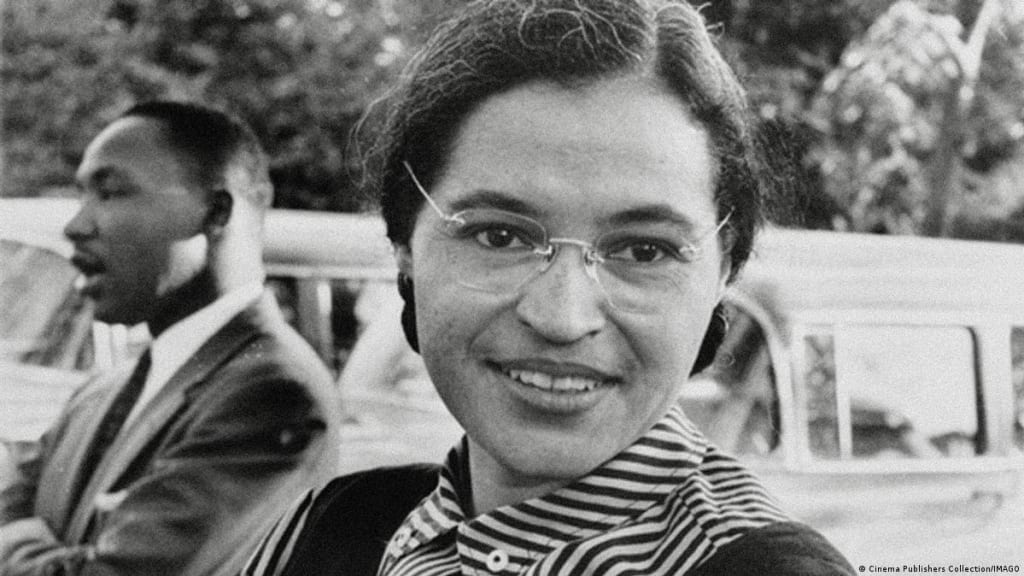Rosa Parks: The Catalyst of the Civil Rights Movement
by David Pieringer

Rosa Parks: The Catalyst of the Civil Rights Movement
Rosa Parks, often referred to as the "mother of the civil rights movement," is a towering figure in American history. Her act of defiance on December 1, 1955, when she refused to give up her seat to a white passenger on a Montgomery, Alabama bus, ignited a nationwide movement against racial segregation and discrimination. Born on February 4, 1913, in Tuskegee, Alabama, Rosa Parks's life was marked by her steadfast commitment to justice and equality. This article delves into her early life, her pivotal role in the Montgomery Bus Boycott, her continued activism, and her enduring legacy.
Early Life and Influences
Rosa Louise McCauley was born to James and Leona McCauley. Her father was a carpenter, and her mother was a teacher. After her parents separated, Rosa moved with her mother to Pine Level, Alabama, to live with her maternal grandparents. Her grandparents were former slaves and strong advocates for racial equality, instilling in Rosa a deep sense of pride and resistance to racial injustice.
Rosa attended the Industrial School for Girls in Montgomery, a private school founded by the Alabama State Teachers Association. She later enrolled in Alabama State Teachers College for Negroes (now Alabama State University), but was forced to leave to care for her ill grandmother and later her mother. Despite these interruptions, Rosa's education and upbringing imbued her with a strong sense of justice and the importance of standing up against oppression.
Marriage and Early Activism
In 1932, Rosa married Raymond Parks, a barber and an active member of the National Association for the Advancement of Colored People (NAACP). Raymond encouraged Rosa to complete her high school education, which she did in 1933. Both Rosa and Raymond were deeply involved in civil rights activities, and Rosa joined the Montgomery chapter of the NAACP in 1943, becoming one of its few female members and eventually its secretary.
Rosa Parks's work with the NAACP involved investigating cases of racial injustice, particularly those involving violence against African Americans. Her commitment to civil rights was evident long before her famous bus protest, as she worked quietly and diligently to fight racial discrimination and support victims of injustice.
The Montgomery Bus Boycott
On December 1, 1955, Rosa Parks boarded a bus in Montgomery after a long day of work as a seamstress. Segregation laws at the time required African Americans to sit in the back of the bus and to give up their seats to white passengers if the front seats were filled. When the bus driver demanded that Rosa and three other African American passengers give up their seats for white passengers, Rosa refused. Her quiet but firm defiance led to her arrest for violating segregation laws.
Rosa's arrest galvanized the African American community in Montgomery. The Women's Political Council, led by Jo Ann Robinson, immediately began organizing a bus boycott to protest Rosa's arrest and the broader system of racial segregation. The boycott was officially launched on December 5, 1955, the day of Rosa's trial, and lasted for 381 days.
The Montgomery Bus Boycott was a massive undertaking that required the cooperation and dedication of the entire African American community in Montgomery. Led by a young pastor, Dr. Martin Luther King Jr., the boycott involved carpooling, walking long distances, and organizing alternative transportation to avoid using the segregated bus system. The boycott put immense economic pressure on the bus company and the city of Montgomery, highlighting the power of collective action in the fight for civil rights.
Legal Victory and National Impact
The boycott's success was not just a result of the community's resolve but also of strategic legal action. The NAACP filed a lawsuit, Browder v. Gayle, challenging the constitutionality of segregated seating on public buses. On June 5, 1956, a federal district court ruled that bus segregation was unconstitutional, a decision that was upheld by the U.S. Supreme Court on November 13, 1956. The ruling effectively ended segregation on public buses in Montgomery and marked a significant victory for the civil rights movement.
Rosa Parks's act of defiance and the subsequent boycott garnered national and international attention, propelling the civil rights movement into the spotlight. Rosa became a symbol of resistance and courage, inspiring countless others to join the fight against racial injustice.
Continued Activism
After the boycott, Rosa Parks faced continued harassment and threats, prompting her and her husband to move to Detroit, Michigan, in 1957. In Detroit, Rosa continued her activism, working with prominent civil rights leaders and organizations. She joined the office of U.S. Representative John Conyers, where she worked from 1965 to 1988, focusing on issues such as housing, employment, and criminal justice reform.
Rosa also co-founded the Rosa and Raymond Parks Institute for Self Development in 1987, which aimed to educate and inspire young people to carry on the legacy of the civil rights movement. Through the institute, Rosa worked to empower the next generation of activists and to ensure that the lessons of the past would continue to inspire future efforts for social justice.
Personal Life and Recognition
Despite her significant contributions to the civil rights movement, Rosa Parks remained a humble and private individual. She endured financial difficulties and health challenges throughout her life but remained dedicated to the cause of justice. Rosa's unwavering commitment to civil rights was recognized through numerous awards and honors, including the Presidential Medal of Freedom in 1996 and the Congressional Gold Medal in 1999, two of the highest civilian honors in the United States.
Rosa Parks passed away on October 24, 2005, at the age of 92. Her death was met with an outpouring of tributes and remembrances from around the world. She was the first woman to lie in honor at the U.S. Capitol, a testament to her monumental impact on American history and the ongoing struggle for civil rights.
Legacy and Impact
Rosa Parks's legacy is profound and enduring. Her act of defiance on that Montgomery bus is often seen as the spark that ignited the civil rights movement, leading to significant changes in American society and law. The Montgomery Bus Boycott demonstrated the power of collective action and civil disobedience in challenging systemic injustice.
Rosa's courage and steadfastness continue to inspire activists around the world. Her story is a reminder that ordinary individuals can make extraordinary contributions to the fight for justice. Her emphasis on the importance of grassroots activism and community organizing remains relevant today as new generations confront ongoing issues of racial inequality and social injustice.
Influence on Civil Rights Legislation
The impact of Rosa Parks and the Montgomery Bus Boycott extended far beyond Montgomery and helped set the stage for subsequent civil rights legislation. The success of the boycott and the legal victory in Browder v. Gayle demonstrated the effectiveness of coordinated activism and legal challenges in dismantling segregation.
The civil rights movement gained momentum, leading to the passage of landmark legislation such as the Civil Rights Act of 1964 and the Voting Rights Act of 1965. These laws were crucial in outlawing racial discrimination in public accommodations, employment, and voting, significantly advancing the cause of civil rights in the United States.
Educational Initiatives and Public Memory
Rosa Parks's contributions to civil rights are commemorated in various ways, ensuring that her legacy is preserved for future generations. Schools, libraries, streets, and other public institutions across the country bear her name, serving as reminders of her pivotal role in American history.
Educational initiatives, such as the Rosa Parks Library and Museum in Montgomery, Alabama, provide valuable resources for learning about her life and the broader civil rights movement. These institutions offer programs, exhibits, and events that educate the public about Rosa Parks's contributions and the ongoing struggle for racial equality.
Cultural Representations
Rosa Parks's story has been depicted in numerous books, films, and documentaries, highlighting her impact on American culture and history. Works such as the film "The Rosa Parks Story" and the book "Rosa Parks: My Story" provide detailed accounts of her life and the events surrounding the Montgomery Bus Boycott.
These cultural representations help to keep Rosa's story alive and accessible, allowing new generations to learn about her courage and determination. They also serve as powerful tools for promoting awareness and understanding of the civil rights movement and the ongoing fight for justice.
Global Influence
Rosa Parks's influence extends beyond the United States, resonating with activists and movements around the world. Her example of peaceful resistance and her role in challenging systemic oppression have inspired global efforts for social justice and human rights.
Internationally, Rosa Parks is celebrated as a symbol of resistance against injustice and as a beacon of hope for those fighting against oppression. Her story underscores the universal principles of dignity, equality, and justice, transcending national boundaries and inspiring a global audience.
Challenges and Misconceptions
While Rosa Parks is widely celebrated for her role in the civil rights movement, there are common misconceptions about her story. One prevalent myth is that Rosa's act of defiance was a spontaneous decision made by an exhausted woman. In reality, Rosa Parks was a seasoned activist with a long history of involvement in the civil rights movement. Her decision to resist segregation was a deliberate and strategic act of protest.
Understanding the full context of Rosa Parks's activism is essential for appreciating her contributions. It highlights the importance of organized resistance and the collective efforts of many individuals who worked tirelessly to challenge segregation and discrimination.
Conclusion
Rosa Parks's life is a testament to the power of individual action and collective struggle in the fight for justice and equality. Her refusal to give up her seat on a Montgomery bus in 1955 ignited a movement that transformed American society and advanced the cause of civil rights.
Rosa Parks's legacy is one of courage, resilience, and unwavering commitment to justice. Her contributions to the civil rights movement continue to inspire activists and leaders around the world. As we remember and honor Rosa Parks, we are reminded of the importance of standing up against injustice and the enduring
About the Creator
David Pieringer
Welcome to my page! I'm a dedicated writer and student with a passion for both education and sports. Balancing my love for learning with my athletic pursuits, I strive to excel in everything I do.
Enjoyed the story? Support the Creator.
Subscribe for free to receive all their stories in your feed. You could also pledge your support or give them a one-off tip, letting them know you appreciate their work.






Comments
There are no comments for this story
Be the first to respond and start the conversation.